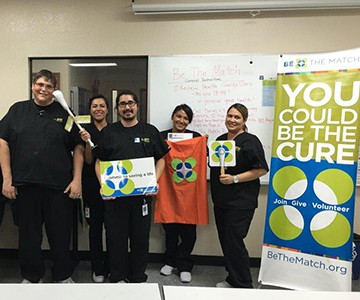Visalia campus hosts Be the Match for 3rd straight year
 Right now, there are more than 14,000 people diagnosed with blood cancers like leukemia, sickle cell anemia and lymphoma, whose very lives depend on a bone marrow transplant or blood marrow transfusion. Every three minutes – last year it was every four minutes – someone new receives such a diagnosis and begins their search for a bone marrow donor match.
Right now, there are more than 14,000 people diagnosed with blood cancers like leukemia, sickle cell anemia and lymphoma, whose very lives depend on a bone marrow transplant or blood marrow transfusion. Every three minutes – last year it was every four minutes – someone new receives such a diagnosis and begins their search for a bone marrow donor match.
For the last three years, SJVC’s Visalia campus students, staff and faculty have been part of the effort to recruit potential donors for those in that waiting line. Students, especially those who are in medical programs, hear the need and answer the call.
“There are two reasons I decided to become a donor,” says Jonathan Holland, Medical Assisting student. “First, the Hippocratic oath says that we must do all we can to save a life. As a medical assistant, I should be doing what I can to help save someone who has cancer. Second, it’s a part of my faith. I am a Christian, and it is my belief that I must give from myself to save others just as Jesus Christ gave himself to save me.”
On July 13th, representatives from the City of Hope’s Be the Match Bone Marrow Registry spent the day at the Visalia campus, explaining the medical need, the importance of registering as a donor and the medical process undertaken to save a life through their blood and bone marrow donor program.
“When patients suffering from blood cancers are referred to the Be the Match organization, it is truly their last hope,” says Kerrie Liles, Dean of Student Services at the Visalia campus, and event organizer. “They need a marrow donor to live.”
Students, staff and faculty rallied to the cause, and many completed the registry process to become a potential donor. It takes just 10 minutes to save a life, a message on the organization’s flier, spoke to 144 hearts on campus that day. The biological results of a simple cheek swab of four areas (upper/lower, right/left) are entered into a world-wide database in hopes of matching someone desperate for a donor miracle.
Currently, 70% of those in need of a donor have no blood/marrow-compatible family member and must rely on a complete stranger’s generosity. Only about half of those patients ever find one.
Cancer impacts more lives than those who are diagnosed with this disease.
“I have seen what cancer does to someone, not just the person with it but those around them,” says Jonathan. “My grandmother died from ovarian cancer last year. It was hard on her body, but she stuck through it as long as she could. Though it was hard for my mother, who had been taking care of her for several years prior. I wouldn’t want anyone to have to go through what my family and I had to go through. That is why I want to help those suffering with cancer.”
It takes more than willingness to become a donor. Potential donors must meet three important standards:
- Be between the age of 18-44
- Be willing to help any patient in need
- Be in general good health
Between 12-14 million donors are registered in the worldwide database. When a match is made, donors travel to the City of Hope Hospital in Los Angeles where all blood and bone marrow draws are performed.
Donors are compensated for travel expenses, including child care, food, lodging and transportation. The City of Hope provides students with a letter to their college Dean, requesting that a student’s absence not result in any form of penalty.
The process of extraction is different depending on whether the cancer patient is an adult or child. The donor for an adult patient is hooked up to a machine that extracts marrow from a blood line from one arm before returning it to the other arm, in a process that takes a few hours.
The process is more intricate when donating to a child. Donors are anesthetized for 60-90 minutes while marrow is extracted from the hip bone. Donors may leave after a few hours of observation.
SJVC’s Visalia campus registered over 250 donors during the previous two years they participated in Be the Match. Some very good news came back their way, when they heard one of their previous students became a match for someone in desperate need of a transfusion.
“We learned that one of our students that registered on campus two years ago was recently called to action, when it was indicated she was the match for a terminally ill patient,” says Kerrie. “I was told our student did not hesitate to help when she received the call. I am so incredibly proud and humbled by the tremendous participation of our students, staff and faculty.”
Saving a life is not always part of a career choice; sometimes it is very personal.
“The Be the Match organization continues to be amazed by the outstanding participation by the SJVC Visalia campus each year,” says Kerrie. “We are a college community that cares for the world around us!”